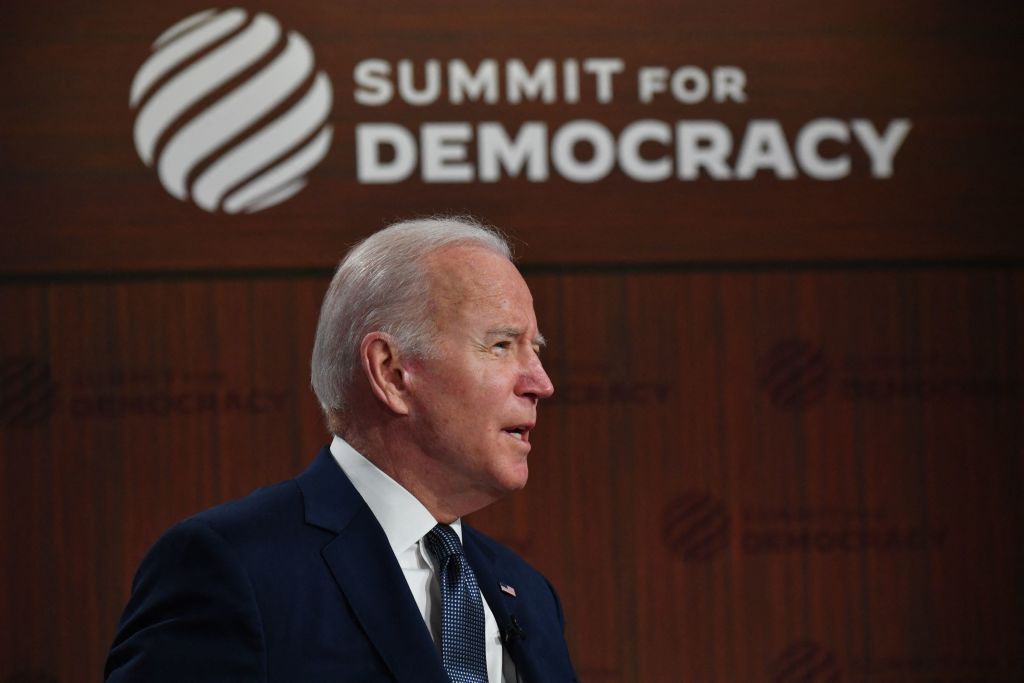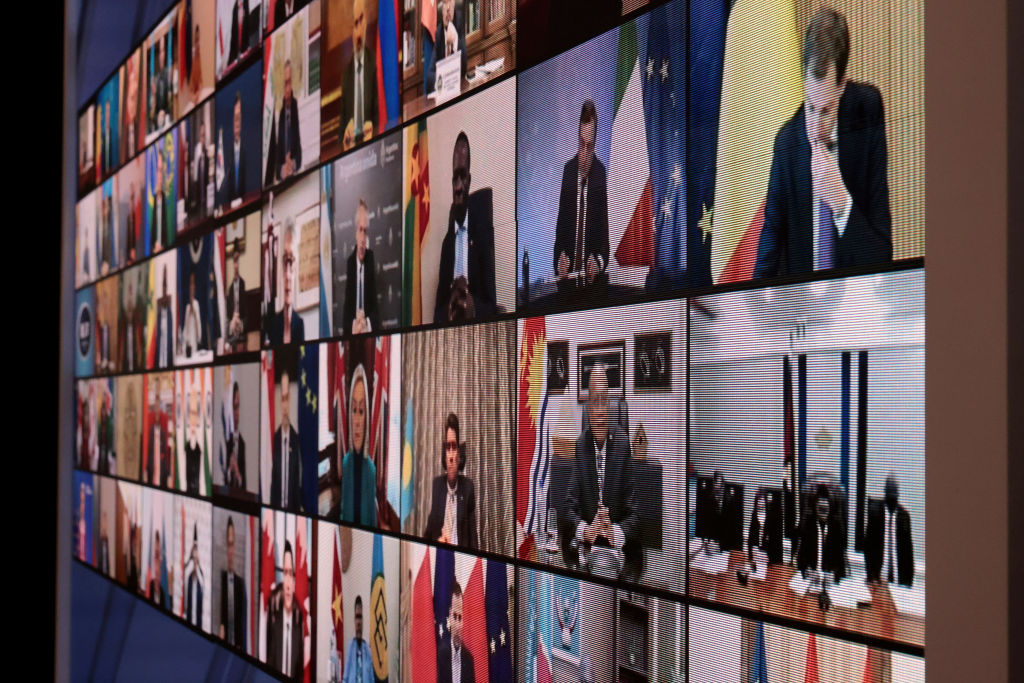
Narendra Modi, Rodrigo Duterte and Jair Bolsonaro walk into a democracy summit. But this isn’t a joke.
Having recently abandoned Afghanistan to an Islamist autocracy and famine, and now finalizing a $650 million arms sale to Saudi Arabia, President Joe Biden thought it would be a fine idea to hold a two-day virtual gathering on democracy, where some of its worst offenders could pose as responsible upholders of freedom and dispense homilies on how to save the world from those like themselves.
According to the State Department, the goal is to “provide a platform for leaders to announce both individual and collective commitments, reforms, and initiatives to defend democracy and human rights at home and abroad.” The online forum, it says, will solicit “bold, practicable ideas” on the themes of “defending against authoritarianism,” “fighting corruption,” and “promoting respect for human rights.”
But there is no explanation as why some countries that are far from democratic have been invited. More than 30 percent of the 110 invited countries are classified by U.S.-based non-profit Freedom House as only “partly free.” Three are “not free” at all—Angola, the Democratic Republic of Congo, and Iraq. More than a dozen are classified by Sweden’s V-Dem Institute as “electoral autocracies” including the Philippines, India and Kenya.
Read More: Want to Strengthen U.S. Democracy? Try This Voting System
Some of the omissions from the participant list are as puzzling as the inclusions. It’s not clear, for example, why strongmen like India’s Modi, the Philippines’ Duterte and Brazil’s Bolsonaro made the cut, but Turkey’s Recep Tayyip Erdogan didn’t, when all of them have been wrecking democratic institutions in their respective countries with equal vigor. There is no logic as to why an invitation was extended to Pakistan (which spared the Biden administration any further embarrassment by declining it). It is one of the most dangerous countries in the world, with a military-backed government that came to power through a heavily rigged election, and is notorious for rights violations. Nor does it make sense that an invitation was denied to Singapore, which may be a de facto one-party state, but it holds clean elections and offers a quality of life and security to its people that many invitees at the summit would kill for. (That is why public trust in politicians in Singapore is far higher than in the countries participating in the summit—higher, even, than in the host country itself.)
Speaking in Islamabad on Thursday, Pakistani prime minister, Imran Khan, said his country had no intention of becoming a part of any political bloc. The world suffered heavily because of Cold War, he said, and Pakistan did not want to get trapped in a new one. He was not speaking about Biden’s summit in particular, but the allusion was obvious. No matter how much the White House talks about democracy, the gathering is really about creating a coalition against China and Russia. Think the QUAD alliance, but on an industrial scale.

Why the Summit for Democracy is a geopolitical ploy
Democratic backsliding has intensified globally, amid rising inequality and the resultant sense of powerlessness among voters. As people lose faith in their political systems, the attraction increases for demagogues, who in turn undermine democratic institutions even further. The proportion of countries classified as “Not Free” by Freedom House is now the highest it has been in the past 15 years. The international balance of freedom, it says, shifted in 2020 in favor of tyranny. To his credit, Biden has consistently spoken about such challenges: the world is at an “inflection point” between democracy and autocracy and “we’ve got to prove democracy works,” he declared in one of his first foreign policy speeches upon becoming president.
The summit also has many worthy panelists meditating on some of the gravest threats facing democracy today, with voices beyond government leaderships. But conflating attacks on political freedom with a simplistic global contest between supposed democracies on the one hand, and China and Russia on the other, is plain disingenuous, and offers a legitimizing platform to some nations who themselves are the source of many of the threats.
Take India. Less than 20 percent of the world’s population now lives in a “Free” country, Freedom House says—and this is because the world’s most populous democracy, with its 1.3 billion people, is now only considered “Partly Free.” India’s descent into authoritarianism has intensified in recent years under Modi. His government, to quote Freedom House’s Freedom in the World 2021 report, caused a “dangerous and unplanned displacement of millions of internal migrant workers” through a “ham-fisted lockdown” during the pandemic, and “encouraged the scapegoating of Muslims, who were disproportionately blamed for the spread of the virus and faced attacks by vigilante mobs.”
It concludes: “Rather than serving as a champion of democratic practice and a counterweight to authoritarian influence from countries such as China, Modi and his party are tragically driving India itself toward authoritarianism.” But the summit now plans to solicit from Modi “bold, practicable ideas” on safeguarding liberty, and Biden wants to pretend that democracy is losing the battle with autocracy because of China and Russia. This, after ignoring—as Trump did—the recommendation of the United States Commission on International Religious Freedom to list India as one of the worst offenders of freedom of worship. All of this is because of India’s strategic importance in America’s rivalry with China. It comes down to geopolitics.
Read More: How the Withdrawal from Afghanistan Exposes a Fault Line in U.S. Democracy
China meanwhile has been shrugging off its exclusion from the summit by claiming that it, too, is a democracy—one “that works,” according to a position paper released by China’s apex governing body, the State Council.
It plays on the growing perception that something broken about the Western model. A much-cited study in 2014 by political scientists Martin Gilens and Benjamin Page looked at nearly 1,800 policy issues over two decades and found that ordinary Americans had virtually no influence on how these were handled by politicians, who were swayed more by economic elites and small interest groups.
No surprise then that 85% of Americans now say their political system needs to change. They are thoroughly disillusioned with their governing structures, and it’s not because China and Russia promise a better alternative and have successfully conspired to erode trust in democracy. It’s because of what democracies have done to themselves. Globally, the share of individuals who say they are “dissatisfied” with democracy has jumped from 47.9% in the mid-1990s to 57.5%—“the highest level of democratic discontent on record,” finds a study by the University of Cambridge based on a data set of more than 4 million people across 154 countries.
“This is an urgent matter,” Biden said while opening the summit yesterday. “The data we’re seeing is largely pointing in the wrong direction.”
But he, too, is pointing in the wrong direction. There is no global contest between democracy and autocracy. The struggle is entirely internal and it’s silly to pretend otherwise.
More Must-Reads from TIME
- Cybersecurity Experts Are Sounding the Alarm on DOGE
- Meet the 2025 Women of the Year
- The Harsh Truth About Disability Inclusion
- Why Do More Young Adults Have Cancer?
- Colman Domingo Leads With Radical Love
- How to Get Better at Doing Things Alone
- Michelle Zauner Stares Down the Darkness
Contact us at letters@time.com